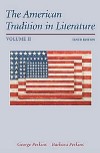Mark Twain wrote from the perspective of a realist. His early writings reflect regional roots, and he returned, over and over again throughout his literary career, to his Midwest and Western experiences. His sketches and humorous essays draw upon folk speech, tales, and beliefs. At core was a healthy skepticism balanced by strong moral code and common sense. Like many intellectuals of his period, both in Europe and America, he questioned many popular beliefs, attitudes, and assumptions about a wide range of subjects: religion, politics, and national goals. At the same time, he embraced many of the values of the nineteenth century-faith in the promise of new technologies, the pioneer spirit, and the entrepreneurial adventure. |



 2003 McGraw-Hill Higher Education
2003 McGraw-Hill Higher Education